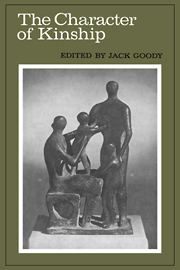Book contents
- Frontmatter
- Contents
- Dedication
- Introduction
- KINSHIP AND DESCENT
- Descent and Marriage Reconsidered
- Kinship, Descent and Locality: Some New Guinea Examples
- Descent in New Guinea: an Africanist View
- Complementary Filiation and Bilateral Kinship
- THE NATURE OF KINSHIP
- THE NATURE OF THE FAMILY
- MARRIAGE AND AFFINAL ROLES
- Bibliography of the Writings of Meyer Fortes
- References
- Index
Kinship, Descent and Locality: Some New Guinea Examples
Published online by Cambridge University Press: 07 May 2010
- Frontmatter
- Contents
- Dedication
- Introduction
- KINSHIP AND DESCENT
- Descent and Marriage Reconsidered
- Kinship, Descent and Locality: Some New Guinea Examples
- Descent in New Guinea: an Africanist View
- Complementary Filiation and Bilateral Kinship
- THE NATURE OF KINSHIP
- THE NATURE OF THE FAMILY
- MARRIAGE AND AFFINAL ROLES
- Bibliography of the Writings of Meyer Fortes
- References
- Index
Summary
‘What is the irreducible fact about fatherhood?’ After worrying at the problem unsuccessfully for some minutes we would be faced with the reply: ‘fatherhood itself’. In this way at undergraduate seminars students in social anthropology classes were introduced to the quality of Meyer Fortes's ideas on kinship. His position in the debate on the nature of kinship was, and is, clear. It is re-stated in his book Kinship and the Social Order, where he refers (1969: 52) to ‘the irreducible genealogical connections, the given relations of actual connectedness, which are universally utilized in building up kinship relations and categories’. And with regard to kinship terms: ‘Their distinctive character arises from the generally recognized fact that the relations they designate have their origin in a distinct sphere of social life, the sphere which, for both observers and actors, is demarcated by reference to the base line of genealogical connection’ (p. 53, cf. 251–2). Fortes refers to these points as anthropological commonplaces; yet, of course, they are not ones which are unchallenged, even within the school of British social anthropologists of the 1940s to 1960s. Beattie, in arguing against Ernest Gellner's suggestion that an ideal language for kinship structure theory should be developed, based on various possible kinds of biological relationship, states that ‘kinship as it is studied by social anthropologists is not a set of genealogical relationships, it is a set of social relationships.
- Type
- Chapter
- Information
- The Character of Kinship , pp. 21 - 34Publisher: Cambridge University PressPrint publication year: 1974
- 5
- Cited by



